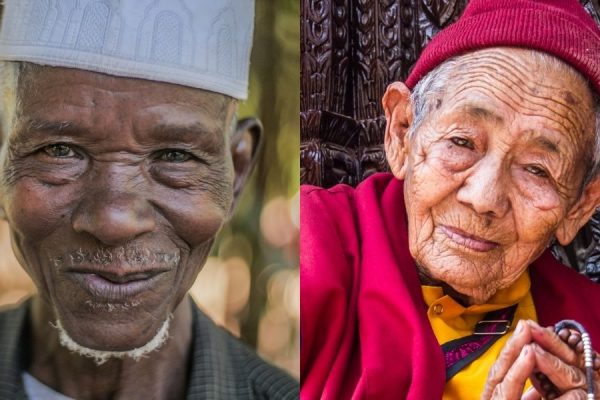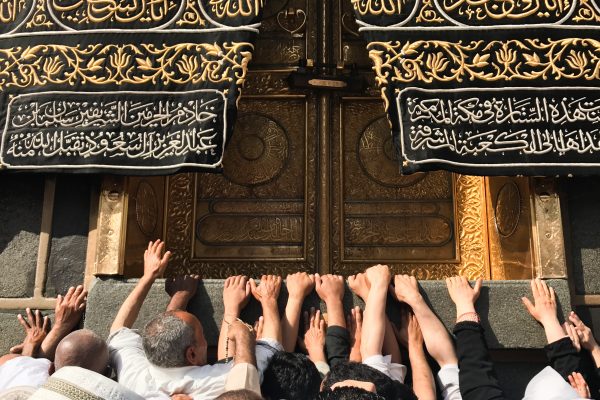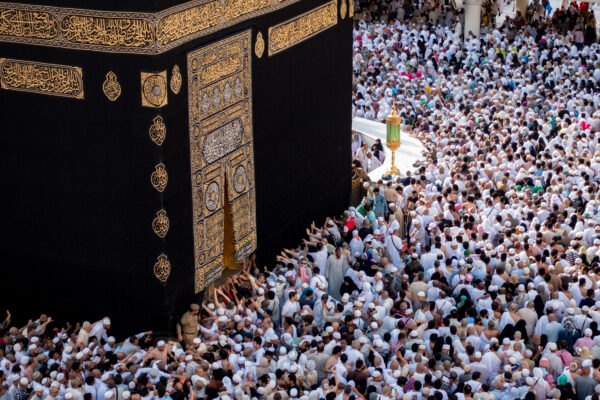In the Name of Allah, the Most Kind, the Most Merciful.
With the Hajj season upon the Muslim world again, it is normal that broadcast and social media will share images and write-ups about the beautiful spectacle that is millions of people flocking to the House of God in order to participate in the rituals. Sharing these images often evokes questions and interest into this journey of a lifetime, be it from friends or work colleagues.
It is necessary therefore, to review the objectives of the Hajj pilgrimage beyond those who are going for Hajj itself and understand its relationship to the non-Muslim audience and how we might present those benefits to them.
This comes from the wider understanding of the purposes of Hajj itself being for all of mankind, and though its rituals may be limited to Muslims, its aims are universal. Such a concept is derived from the Qur’an itself when Prophet Ibrahim (a) is commanded to announce Hajj to mankind – not believers or Muslims only – but to all mankind. And those who would flock would witness the benefits – spiritual, material, political and economic.
وَأَذِّن فِي النَّاسِ بِالْحَجِّ يَأْتُوكَ رِجَالًا وَعَلَىٰ كُلِّ ضَامِرٍ يَأْتِينَ مِن كُلِّ فَجٍّ عَمِيقٍ “And proclaim among men the Pilgrimage: they will come to you on foot and on every lean camel, coming from every remote path” / لِّيَشْهَدُوا مَنَافِعَ لَهُمْ “That they may witness advantages for them”
[22:7-8]
This sermon focuses on the benefits to those who do not attend, and how we might represent those to the wider world.
First Allah (swt) introduces Prophet Ibrahim (a) as a unifying individual. In Surat al-Baqarah, the chapter is divided into multiple subtopics: Purpose and creation; The Children of Israel; relationship to other faiths. From around verse 130 the Qur’an brings in the story of Ibrahim (a) and that there being an agreement of the previous peoples to worship that which Abraham worshipped and to follow his path. The Qur’an mentions:
إِذْ حَضَرَ يَعْقُوبَ الْمَوْتُ إِذْ قَالَ لِبَنِيهِ مَا تَعْبُدُونَ مِن بَعْدِي قَالُوا نَعْبُدُ إِلَٰهَكَ وَإِلَٰهَ آبَائِكَ إِبْرَاهِيمَ “When death visited Yaqoub, when he said to his sons: What will you serve after me? They said: We will serve your God and the God of your fathers, Ibrahim”
[2:133]
This is followed up by telling the believers to announce their belief and following of Ibrahim (a) too and that we do not make distinctions amongst prophets, following some but not others, like some have chosen to do. Moreover, if the other religions were to follow this way they too would be rightly guided.
Say: We believe in Allah and (in) that which had been revealed to us, and (in) that which was revealed to Ibrahim and Ismail and Ishaq and Yaqoub and the tribes, and (in) that which was given to Musa and Isa, and (in) that which was given to the prophets from their Lord, we do not make any distinction between any of them, and to Him do we submit. If then they believe as you believe in Him, they are indeed on the right course, and if they turn back, then they are only in great opposition”
[2:136-137]
This verse then tells us that from the Islamic perspective, Hajj is not only about following the rituals of Prophet Ibrahim (a) but to use him as a point of return, unity, and cohesion amongst faiths. To enliven and share in his story would bring proximity between the faiths and encourage – as Abraham did – the worship of One God, alone, the very essence of Islam.
Second, religion today has often become watered down, extremely secularised, or infused with liberal ideas. Spirituality is often conflated with things like meditations or yoga as replacements for prayer and rigorous self-development. Some religions promote running away from the world or self-denial as means of growth. In the Islamic perspective, it is to participate in society where you will engage with people of different maturity levels who will bring out the best and worst in you that would help your growth.
In business for example, if a person has the characteristics of a cheater, they will use contracts or negotiations to be a means of cheating; business will be the tool of his conniving self. In marriage for example, if a person is compassionate and empathetic, they will use these to navigate the challenges of their partner or families.
Hajj has a multitude of rituals, condensed into five days, in the heat and crowding of Mecca, Mina, Muzadalifa and ‘Arafat. It will be a lifetime’s worth of challenges in the space of 120 hours with people from all cultures, languages, and sects. The purpose of this is to discover your real self; to understand why you are the way you are, how you react, and what you are capable of in those circumstances – especially when 25 different things are prohibited to you in the state of Ehram.
In a famous narration, Imam ‘Ali ibn al-Hussain Zain al-Abideen was performing Tawaaf of the Ka’ba with a blind companion who began to comment on how crowded it seemed to him this year. The Imam prayed to God to return his vision but with spiritual insight and for a moment the man was bewildered by what he saw exclaiming, ‘Oh Son of the Messenger of Allah! Why are there so many animals here performing Tawaaf?! I see snakes and dogs and donkeys!’ He replied, ’These are the inner realities of the people you are seeing!’
Third, the Muslim ummah partakes in many events together throughout the year. The month of Ramadaan allows us to engage in one act together, fasting. In Hajj, the Muslim world throws off the shackles of its differences, from sect to creed to colour to wealth to position, and demonstrates its capability to unite for a grander purpose.
This is awe-inspiring and cannot be easily replicated. This should demonstrate the potential that people have when pettier differences can be put aside and the essential purposes of creation are put at the forefront of human endeavour. It is for this reason Imam ‘Ali (a) said:
والحَجَّ تَقْوِيَةً لِلّدينِ / The Hajj is a means of strengthening the religion.”
With these three areas – interfaith unity under the banner of the Father of Monotheism, Prophet Ibrahim (a), and the ability to discover ones true self and the ability to discover the potential of a united Muslim community – can we introduce the Hajj pilgrimage to others. It may be that it illuminates the heart of another and bring them closer to Islam for as the holy verse says:
إِنَّ في ذلِكَ لَذِكْرى لمَنْ كَانَ لَهُ قَلْبٌ أوْ ألْقى السَّمْعَ وهُوَ شَهيدٌ / “Most surely, there is a reminder in this for him who has a heart or he gives ear and is a witness (50:38).”





